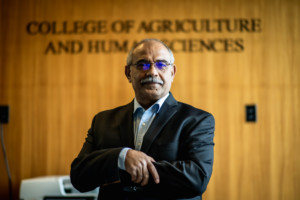PRAIRIE VIEW, Texas (April 27, 2022) Ali Fares, endowed professor of Water Security and Water-Energy-Food Nexus at Prairie View A&M University, maintains that “a changing climate has impacted how we work, how we live, how we play, and how we do business; it is impacting all aspects of our lives.” Therefore, when landowners on the Navasota River raised concerns with the Brazos River Authority (BRA) about increased flooding, he sought out funding to study the reasons.
With $131,610.00 in funding from Texas A&M University at Galveston (TAMUG), Fares collaborates with BRA and Texas A&M University (TAMU) to better understand the factors leading to the reported flooding problems. He aims to generate mitigation strategies to reduce potential impacts on the region over the long term.
The year-long Navasota River Flood Study’s initial data indicates that the reservoir has not increased flows into the river. The causes, impacts, and solutions to reported flood problems along the Navasota River below Lake Limestone remain unknown and require further investigation.
“As a Professor of Water Security, Dr. Ali Fares is a well-known and highly sought after for his expertise on environmental issues involving water. With the ongoing climate concerns, the increased flooding landowners are experiencing will not be subsiding anytime soon,” said PVAMU Vice President of Research & Innovation Magesh Rajan, Ph.D., PE, MBA. “This opportunity for Dr. Fares and his team to investigate the severity of the surface challenges and offer innovative solutions for water allocation, irrigation management, and adaptation will impact the lives and livelihoods of so many people along the 125-mile stretch of the Navasota River.”
With Co-Principal Investigators from the College of Agriculture and Human Sciences (CAHS), Ripendra Awal, Ph.D., and Ram Ray, Ph.D., the Prairie View A&M University team will analyze the watershed-level land cover change analysis over the last several decades. They hope to understand better how increasing development and the impervious surface cover have changed stormwater runoff and drainage systems to the extent it has exacerbated floods along the Navasota River.
The collaborative project lead is the Institute for a Disaster Resilient Texas (IDRT) at TAMUG in collaboration with the Texas Water Resources Institute (TWRI) at TAMU, PVAMU College of Engineering, and BRA staff members.
In addition to a technical report and peer-reviewed publications, Fares expects the research findings to inform and be integrated into the broader State Regional Flood Planning process currently underway.
Karen B. Cotton


